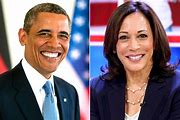President Barack Obama’s legacy is a topic that continues to stir debate and reflection within the Democratic Party. The once shining aura surrounding Obama and his team of strategists seems to be losing its luster, as Democrats grapple with evolving political landscapes and shifting voter demographics.
One significant event that highlighted this changing dynamic was Kamala Harris’ unsuccessful 2024 presidential campaign. Notably, when Jim Messina, an Obama campaign alum, was approached to lead Harris’ bid, he received a cautionary message from Democratic megadonor John Morgan. In response to Messina’s potential involvement, Morgan warned him,
“If you get involved in this, it’ll be political suicide… You’re going to be a loser.”
The aftermath of Harris’ defeat shed light on the diminishing influence of key figures like David Plouffe, once considered the mastermind behind Obama’s successful 2008 victory. Plouffe’s involvement in Harris’ campaign did not yield the desired results, leading to criticisms that tarnished his reputation within Democratic circles. Referring to Plouffe’s current status post-Harris’ loss, Morgan remarked,
“Now he’s just an old broken-down boy who lost. Big.”
These instances underscored a growing sentiment among Democrats that Team Obama’s prominence may be waning.
Amidst these reflections lies a deeper critique of how Obama-era strategies have impacted the party’s trajectory over time. Some DNC officials have pointed out that Obama’s lack of investment in state parties during his tenure has had lasting repercussions on local organizing efforts within the party. Furthermore, shifts in voter demographics and allegiances have signaled a departure from the once-revered “Obama coalition” of voters.
As Democrats navigate through these challenges and reassess their approach towards future elections, questions arise about the continued reliance on veteran operatives associated with past administrations. Criticisms leveled against figures like Plouffe highlight a broader call for new perspectives and fresh voices within the party apparatus.
In response to calls for change within Democratic ranks, individuals like Jane Kleeb emphasize the importance of investing in local stakeholders and grassroots organizers. Reflecting on recent election outcomes where such investments paid off significantly, Kleeb stressed the need for returning to fundamental principles of engaging with communities at a grassroots level.
While debates around reshaping Democratic strategies persist, voices both inside and outside the party advocate for a more inclusive approach towards embracing diverse viewpoints and experiences. Analysts like Chuck Rocha underscore the necessity of broadening consultant pools beyond entrenched circles dominated by long-standing operatives linked to previous administrations.
Looking ahead into future electoral cycles raises critical questions about how best to adapt campaign strategies and messaging to resonate with evolving voter sentiments. Younger generations coming into political maturity without direct experience of past administrations pose unique challenges requiring innovative approaches from Democratic leadership moving forward.
The ongoing introspection within Democratic circles underscores a pivotal moment in redefining party dynamics and recalibrating strategies for upcoming electoral challenges. As new voices emerge alongside established figures from previous eras, navigating this transition will shape not only individual campaigns but also set broader trends influencing the party’s trajectory in years to come.

